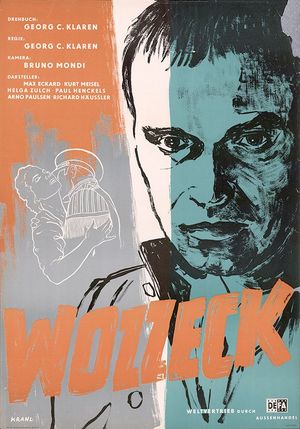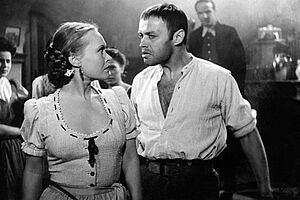Wozzeck
Regie: Georg C. Klaren, 101 Min., Schwarz-Weiß, Spielfilm
Deutschland (Sowjetische Zone)
DEFA-Studio für Spielfilme, 1947
- Film-/Videoformat
- 35 mm
- Länge in m
- 2750
- Englischer Titel
- Wozzeck
- Premierendatum
- Anlaufdatum
- Literarische Vorlage
- Büchner, Georg:" Woyzeck", Dramenfragment

(R: Georg C. Klaren, 1947) Grafiker: Siegfried Kranl
Kurzinhalt (Deutsch)
Im Anatomiesaal einer Universität liegt der Körper des Füsiliers Wozzeck, den man gehängt hat. "Ein Mörder", konstatiert der Doktor. "Ein Mensch", sagt der Student Büchner, "den wir gemordet haben." Und er erzählt den Fall vom armen Wozzeck, der zu den Soldaten gezogen wurde und dort jede Demütigung erduldete um eines Zieles willen: Er spart jeden Groschen, um eines Tages ein bescheidenes Leben mit Marie führen zu können, die er liebt und mit der er ein Kind hat. Er erträgt die Schikanen des Hauptmanns und die skrupellosen Ernährungs-Experimente des Doktors, doch dass der stattliche Tambourmajor sich an Marie heranmacht, erträgt er nicht. So wird Wozzeck zum Mörder - an Marie, die ihm das Liebste im Leben war.
(Quelle: Das zweite Leben der Filmstadt Babelsberg. DEFA-Spielfilme 1946-1992)

(R: Georg C. Klaren, 1947) Fotograf: Rudolf Brix

(R: Georg C. Klaren, 1947) Fotograf: Rudolf Brix
Filmstab
- Regie
-
- Georg C. Klaren
- Drehbuch
-
- Georg C. Klaren
- Kamera
-
- Bruno Mondi
- Schnitt
-
- Lena Neumann
- Darsteller
-
- Kurt Meisel (Wozzeck)
- Helga Zülch (Marie)
- Max Eckard (Büchner)
- Paul Henckels (Arzt)
- Richard Häussler (Tambormajor)
- Arno Paulsen (Hauptmann)
- Willi Rose (Andrés)
- Robert Lieffertz-Vincenti (Unteroffizier)
- Kläre Reigwart (Margaret)
- Rotraut Richter (Käthe)
- Elsa Wagner (Großmutter)
- Wolfgang Kühne (Ausrufer)
- Alfred Balthoff (Handwerksbursche)
- Otto Matthies (Handwerksbursche)
- Max Drahn (Idiot)
- Karl Hellmer (Trödler)
- Leo Sloma (Wirt)
- Erich Lothar (Bub Christian)
- Valy Arnheim (Gerichtspräsident)
- Friedrich Teitge (Soldat)
- Eduard Matzig (Soldat)
- Peter Marx (Harmonika-Spieler)
- Friedrich Gnaß (Spießrutenläufer)
- Harald Farrey (Soldat)
- Horst Preusker (Student)
- Ulrich Hoffmann (Student)
- Gunnar Möller (Student)
- Franz-Martin Grüger (Student)
- Achim Glawe (Student)
- Georg Helge (Student)
- Mimi Mittell
- Astrid Köster
- Walter Strasen
- Herbert Cäsar
- Friedrich Kühne
- Margarete Kloppstech
- Heinrich Mann
- Ingeborg Krebs
- Ingeborg Schopek
- Lothar Cronacher
- Alfred Beierle
- Regieassistenz
-
- Fritz Stapenhorst
- Szenenbild
-
- Hermann Warm
- Bruno Monden
- Musik
-
- Herbert Trantow
- Ton
-
- Klaus Jungk
- Kostüm
-
- Walter Schulze-Mittendorff
- Maske
-
- Alois Strasser
- Produktionsleitung
-
- Kurt Hahne
- Karl Gillmore (Produktionsleitung-Assistenz)
- Aufnahmeleitung
-
- Willi Teichmann
- Gestaltung
-
- Lucia Gallo (Choreografie)
- DEFA-Fotograf
-
- Rudolf Brix
Kurzinhalt (Englisch)
The body of a dead man, Franz Wozzeck, whom the state has executed by hanging, is lying on a table in an anatomy lecture theater of a small German university Whereas the doctor in charge of dissecting the cadaver can only see the corpse of a murderer lying on the table, Büchner, a medical student, sees the corpse of a "human being". "A human being", he adds, "that we have murdered". Büchner then proceeds to tell the story of Franz Wozzeck.
Franz Wozzeck. a soldier, is described as being a "poor wretch!”. He only became a soldier and endured the harassment and humiliation by the military authories because his meager soldiers pay allowed him to provide for his small family his beloved wife, Marie, and their child with the bare necessities of life and also to create a modest future for them. It was because of his need to eam money for his family that Wozzeck allowed himself to be misused by a doctor in futile medical experiments - for his participation in the experiments Wozzeck earned a few pennies.
Marie is a beautiful and sensual girl, who loves her Franz But she also suffers from his physical and mental deterioration, and his morbid pathological visions. Owing to her difficulties with Franz, Marie eventually falls into the hands of the tenacious and seductive drum-major. When Wozzeck learns about his wife's infidelity - in their small village, news of conjugal indecorum quickly makes the rounds - he directs his entire indignation and rage against Marie. Indeed, ft's not his tormentors he pursues with his wrath, but rather his beloved wife - whom he eventually kills.
Source: Progress Film-Verleih
Kurzinhalt (Weitere Sprachen)
Nell'aula di anatomia di un'università viene esibito il corpo del fuciliere Wozzeck, per taluni un assassino, per altri, come per lo studente Büchner, "un uomo che abbiamo ucciso". Inizia così il racconto del povero Wozzeck, chiamato a fare il soldato ed esposto a ogni tipo di umiliazione. Il ragazzo risparmia ogni centesimo per poter un giorno condurre una vita dignitosa a fianco di Maria, la donna che ama e da cui ha avuto un figlio. Pur sopportando le angherie del capitano e gli esperimenti del dottore, Wozzeck non tollera il comportamento del tamburmaggiore, che ha puntato gli occhi su Marie. Wozzeck diventa un assassino, uccidendo quanto ha di più caro: Marie. (Italienisch)



